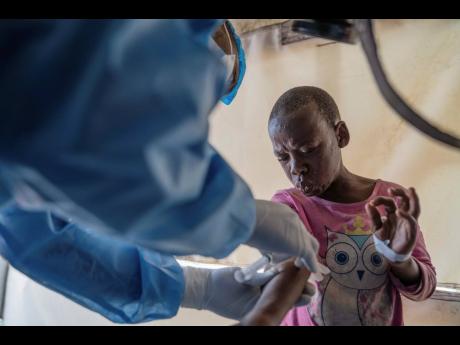Christopher Tufton | Managing the mpox threat
THE BEST defence is a good offence. This is the posture of Jamaica’s public health team as we work to ensure the island’s readiness for the possibility of the mpox virus’ re-entry.
Formerly referred to as Monkeypox, mpox – a rare disease that is similar to smallpox and which can be transmitted by contact and droplet exposure – was recently declared a public health emergency of international concern by the World Health Organization (WHO).
The declaration has come in the wake of the upsurge of mpox in the Democratic Republic of the Congo (DRC) and a growing number of countries in Africa. The WHO has also noted that the virus has the potential to spread further across countries in Africa and possibly outside the continent.
A public health emergency of international concern is defined as “an extraordinary event which is determined to constitute a public health risk to other States through the international spread of disease and to potentially require a coordinated international response”.
This definition implies a situation that is serious, sudden, unusual or unexpected; that it carries implications for public health beyond the affected state’s national border; and that it may require immediate international action.
The outbreak in 2022 was largely among men who have sex with men and was controlled through vaccination and behaviour modification. Safe sexual practices along with practising physical distancing, mask wearing, and frequent hand sanitisation will reduce the likelihood of transmission of the mpox virus.
JAMAICA’S MPOX EXPERIENCE
The first case of mpox in Jamaica was recorded in July 2022. Between then and March 2023, the island recorded a total of 21 confirmed cases – 18 in 2022 and three in 2023. Of the confirmed cases, 18 were male and three were female, with ages ranging from 16 to 52 years. All cases were classified as clade II mpox.
As at Thursday, August 22, there were no cases of mpox reported in Jamaica. However, given the public health risks associated with a single case of mpox, the island has been put on high alert for the virus.
It is to be noted that, in non-endemic countries such as Jamaica, one case is considered an outbreak and, in Jamaica, the virus is a Class 1 notifiable disease. Clinicians should immediately report suspected cases to their Parish Health Department and the ministry’s National Surveillance Unit, regardless of whether they are also exploring other potential diagnoses.
To bolster readiness, surveillance has been heightened, which is critical at this time in order to rapidly identify cases and clusters; provide optimal clinical care; isolate cases to prevent further transmission; identify, manage and follow up contacts to recognise early signs of infection; protect frontline health workers; and identify high-risk groups and tailor effective control and prevention measures.
KEY ACTIONS
Among our key actions at this time is heightened surveillance at ports of entry, which means increased messaging at the ports, and we will interview travellers who have visited countries of interest in the last six weeks. Anyone with symptoms will be treated according to our protocols. Persons without symptoms will be issued health alert cards and told to contact the health department if they develop symptoms.
There will also be increased surveillance in our health facilities, as persons with suggestive symptoms and travel history will be tested and treated according to our protocols. Members of the public are also to advise the health department if they develop signs and symptoms.
In addition, the ministry has begun its national public education and community engagement programme reminding of the response measures for control and care management.
To be clear, everyone should be concerned about this virus; and no effort devoid of partnership in public health is guaranteed to yield success. We, therefore, urge the collaboration of the public who we encourage to take the necessary precautions to safeguard themselves from this disease.
If we work together, as we have in the past, in the public health interest, Jamaica will manage well. Our healthcare professionals are equipped with the knowledge and resources to identify and treat mpox cases. Public health measures such as contact tracing and educating the public about safe practices are already in place; and we are working closely with international health organisations to stay informed and prepared for any developments.
People are urged to follow the guidelines provided by the health authorities and to practise good hygiene, while avoiding close contact with anyone showing symptoms, as well as to seek medical advice if there is any suspicion of having been exposed to the virus.
Dr Christopher Tufton is minister of health and wellness and member of parliament for St Catherine West Central. Send feedback to cctufton@gmail.com or columns@gleanerjm.com.
Some mpox facts
• Human to human transmission of mpox occurs by contact and droplet exposure via exhaled large droplets.
• The incubation period of mpox is usually from six to 13 days but can range from five to 21 days.
• Symptoms can be mild or severe, and associated with skin rash that can be very itchy or painful. Severe disease may be fatal.
• The disease is often self-limiting with symptoms usually resolving spontaneously within 14 to 21 days.
• Symptoms include fever, chills, intense headaches, exhaustion, backache, muscle ache, swollen lymph nodes, and rash.
• Children are at higher risk, and mpox during pregnancy may lead to complications, congenital Mpox or stillbirth
• The virus is normally found in animals, but the disease may be transmitted from animals to humans, usually through bites or scratches or consumption of bush meat.
• Milder cases of mpox may go undetected and represent a risk of person-to-person transmission. There is likely to be little immunity to the infection in those travelling.


